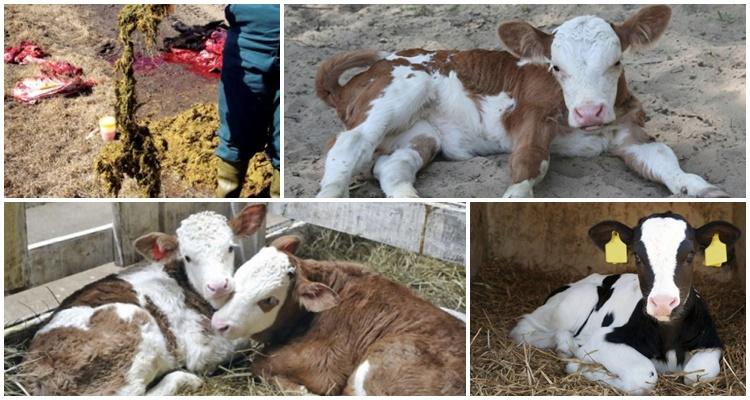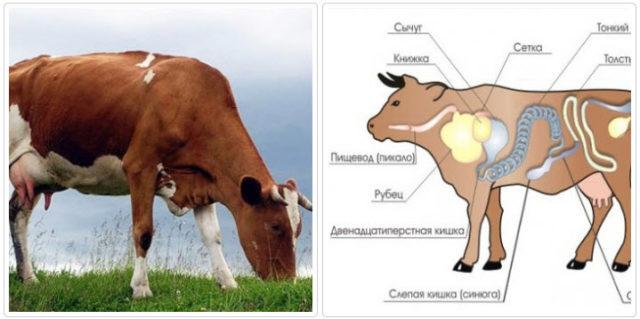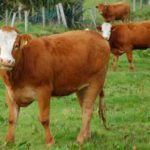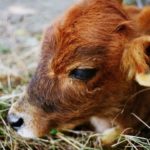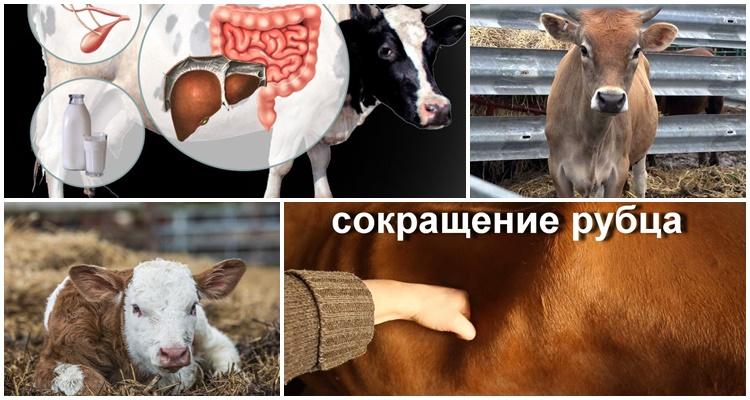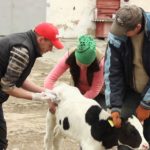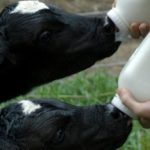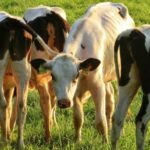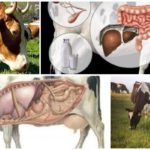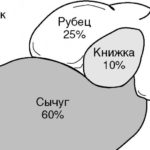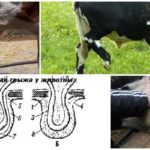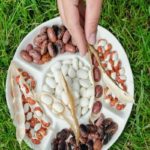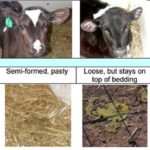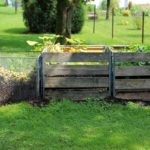A cow is a ruminant animal. This means that she spends almost all her free time looking for and eating food, chewing it thoroughly. Calves are no different from their parents; they also constantly chew anything. But their stomach is much smaller than that of adults. If a calf accidentally eats a rag, it is important to know what to do in such situations, because it can get stuck there for a long time. And this often leads to gastric blockage.
Potential danger
Once a calf has ingested a rag, it creates a number of potential hazards.The worst thing that can happen to him is a blockage in the stomach followed by a stoppage of digestion. In general, a blockage in a cow’s stomach is a dangerous thing.
Their stomach contains bacteria that help digest food. But these bacteria produce a lot of gas. With healthy digestion, this gas naturally escapes. But once the stomach is blocked by indigestible rags or other debris, this movement is disrupted and gas accumulates in the esophagus. The result will be a severely bloated stomach, leading to complications and painful death of the animal.
But an eaten rag does not necessarily threaten the death of the calf. If the rag was small, dilapidated and made of natural material, then it is likely to be overcooked. But this process can take a long time, and this will affect the animal in the following way:
- it will lose a lot of weight;
- will walk sluggishly;
- will begin to refuse food;
- constipation and sometimes diarrhea will appear.
Causes of gastric stoppage
It’s not just an eaten rag that can cause a calf’s stomach to stop, there are many other reasons. They are divided into three categories:
- Human factor.
- The calf's own fault.
- Infectious disease and parasites.
To begin with, it is worth considering the reasons for gastric arrest due to the fault of the person himself. As a rule, this is due to feeding low-quality food. Feeding your calf heavy food that is also cold or hot will inevitably lead to digestive problems. Unsanitary conditions also have a negative impact on livestock. Another common cause of gastric stoppage is calf scare. Because of it, the esophagus narrows greatly, and spasms appear.
Often the cause of gastric failure is the calves themselves.While walking, they eat everything that gets in their way: ropes, rags, polyethylene, various metal objects. Before swallowing something, calves usually chew the object for a long time and, if chewing fails, they simply spit it out.
Another reason is the calf becoming infected with some infectious disease, resulting in gastric paralysis. For example, rabies, tuberculosis, leukemia, E. coli.
How to understand that the stomach has stopped
As soon as the bull's stomach stops, symptoms appear immediately:
- visually noticeable bloating;
- complete refusal of food;
- slightly open mouth, chewing emptiness;
- foam coming out of the mouth;
- weakness, heavy breathing.
If the blockage and stoppage have occurred partially, then a three-week-old calf is still capable of belching gases. But if measures are not taken in time, the stomach may soon stop completely, which will lead to the rapid death of the animal.
How to start digestion in cattle
Before giving your calf any medications or infusions, you need to look down its throat. Sometimes it happens that a foreign object gets stuck in the animal’s throat area without getting into the stomach. If he really has something there, then you should try to get the garbage out with your hand. Small calves do not resist much, so there is no need to tie them.
If it was not possible to remove the foreign object, then first you should give the animal “No-shpu” or “Sulphocamphoin”. Perhaps the stomach stopped due to cramps or a switch to dry food.It is also important to massage the rumen by gently kneading the side of the calf with your fist. If the above methods do not help for several days, then we can say with confidence that the problem is precisely because of an object stuck inside the stomach. In this case, there are two options: either continue to treat the calf using traditional methods, or seek help from a veterinarian.
As a rule, if the stomach really does not work, the veterinarian will prescribe special medications or surgery in a critical situation. However, veterinarians do not work in all localities, so if it is not possible to get qualified help, and the calf has already lost a lot of weight and is on the verge of death, then perhaps the best solution would be to end the animal’s suffering.
Folk remedies
There are several folk methods with which experienced livestock breeders independently start the stomach.
The first method: add 100 grams of yeast to a glass of warm water, then wait 30 minutes for swelling. Then add 200 grams of vodka and 100 grams of sugar to a separate liter container, pour them with swollen yeast. If the resulting infusion is less than a liter, it should be diluted with water. This liquid should be poured into the calf’s throat in small doses twice a day.
The second method: add 10 milliliters of hellebore tincture to a half-liter bottle of water, then pour the solution into the animal’s mouth a couple of times a day.
Also used: tomato juice, decoction of yarrow and St. John's wort, various infusions of moonshine.
Prevention of the problem
First of all, you need to monitor the cleanliness of the feeder and the animals' pen.Often, this is where, due to the owner’s carelessness, garbage ends up: scraps of fabric, bags, ropes, wires and other dangerous rubbish. It is important to monitor the livestock walking area; there should also be no garbage there. Do not hang laundry within reach of cows, and hide garden chemicals and paints.
It is worthwhile to properly plan the diet of calves; they need to be fed food that contains a large amount of minerals and vitamins. They should always have access to clean drinking water. If you comply with all the above conditions and quickly respond to the problem that arises, the calves will grow up vigorous and healthy.

